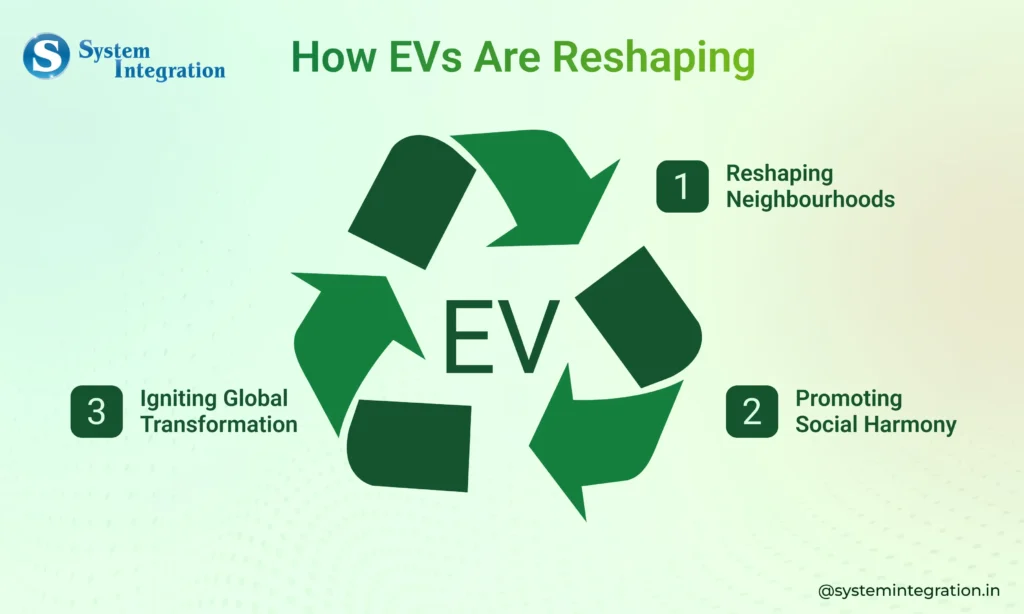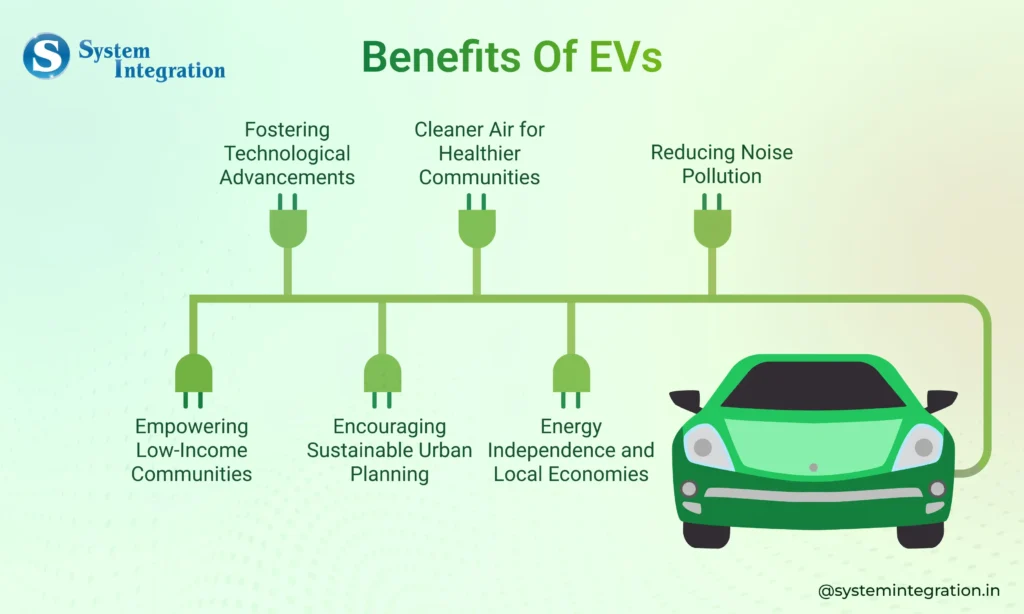Introduction
In an age characterized by unprecedented environmental challenges and growing concerns over climate change, the imperative for sustainable practices has never been more urgent. Central to this pursuit of a greener and cleaner future is the transportation sector, a significant contributor to global carbon emissions. Amidst this critical need for change, Electric Vehicles (EVs) have emerged as a revolutionary force, not only in curbing carbon footprints but also in reshaping neighborhoods, fostering social harmony, and igniting a transformative global movement toward sustainability. In this comprehensive exploration, we delve into the multifaceted role of EVs and their profound impact on communities, society, and the planet as a whole.
The emergence of electric vehicles (EVs) is one of the primary proponents of this “green revolution,” which has seen a tremendous shift in recent years toward sustainable living. Electric vehicles not only significantly reduce carbon footprints and fight climate change, but they also provide a wide range of communal advantages that go far beyond the individual driver.
In this blog, we examine how electric vehicles are reshaping neighborhoods, promoting social harmony, and igniting global transformation.
How Electric Vehicles Are Reshaping

Reshaping Neighborhoods: Paving the Way for Eco-Friendly Infrastructure
The advent of Electric Vehicles has sparked a monumental shift in urban planning and infrastructure development. With the growing emphasis on sustainability, neighborhoods are now being designed with EV charging stations as integral components of their infrastructure. These charging points, often powered by renewable energy sources, become hubs of clean energy dissemination, propelling communities towards a low-carbon future. As EVs become increasingly integrated into the fabric of neighborhoods, they foster a sense of environmental responsibility and engender a more eco-conscious lifestyle among residents.
Promoting Social Harmony: An Inclusive Path to Sustainable Mobility
EVs present an inclusive approach to sustainable mobility, transcending socio-economic barriers and promoting social harmony. Traditional gasoline-powered vehicles have long perpetuated noise and air pollution in disadvantaged neighborhoods, exacerbating existing inequalities. Electric Vehicles, with their silent operation and zero tailpipe emissions, offer a more equitable and harmonious transportation solution. By embracing EVs, communities can prioritize environmental justice, ensuring all members have access to cleaner air and a healthier living environment.
Igniting Global Transformation: A Revolution in Sustainable Transportation
The transition to Electric Vehicles is not just a local phenomenon but a global movement with far-reaching consequences. As countries worldwide acknowledge the urgency of curbing carbon emissions, they are embracing EVs as a pivotal solution. Governments are implementing ambitious targets for EV adoption, investing in charging infrastructure, and offering incentives to accelerate the shift. This concerted global effort is not only transforming the automotive industry but also inspiring other sectors to embrace sustainable practices, igniting a ripple effect towards a more sustainable world.

Benefits of Electric Vehicles
Cleaner Air for Healthier Communities
The contribution that electric vehicles make to cleaner air is one of the most immediate and noticeable advantages. The decrease in harmful pollutants brought on by more EVs on the road improves the air quality in urban areas. Communities that have cleaner air tend to be healthier, with fewer respiratory infections and a lower risk of cardiovascular disease. Children can play outside without being concerned about breathing harmful particles in, and senior citizens can make use of the outdoors without being concerned about smog. Neighborhoods will become greener and more breathable as a result of electric automobiles.
Energy Independence and Local Economies
Making the switch to electric cars is crucial for increasing community energy independence. Communities can produce their own clean electricity through the integration of renewable energy sources like solar and wind, which can then be used to power nearby EV charging infrastructure. By increasing employment opportunities in the renewable energy sector, this decentralization of energy production helps local economies by reducing reliance on fossil fuels.
Encouraging Sustainable Urban Planning
Cities are revising their urban planning methods in response to the rise of electric vehicles. Designing EV-friendly infrastructure, such as public charging stations and parking lots just for EVs, is receiving more attention. Communities may improve city livability and sustainability by encouraging the use of electric vehicles, which also helps to minimize traffic jams, lower noise pollution, and recover land once used by petrol stations.
Empowering Low-Income Communities
Electric vehicles have the potential to empower low-income areas, making them more than just a luxury for the wealthy. The long-term affordability of EVs is increased by their lower operating and maintenance expenses, which lessen the impact of high fuel prices on individuals with limited resources. Additionally, in underserved areas, community-based electric vehicle-sharing programs are being implemented, allowing access to eco-friendly mobility options when public transportation may be insufficient.
Fostering Technological Advancements
The switch to electric vehicles has generated a rush in technological development that is advantageous to all communities. Communities can effectively harness and store clean energy thanks to battery storage technology developed for electric vehicles (EVs) and applied to renewable energy storage. Incorporating smart grid technology also enables improved energy management, which lessens the load on the power grid during peak charging periods.
Reducing Noise Pollution
Because EVs are known for smooth, silent rides, electric cars help reduce noise pollution. This quality is especially important in cities because the constant noise can cause stress and worry. Quieter streets lead to a calmer and more serene neighborhood, giving locals a greater sense of well-being.
Conclusion
Electric vehicles are proving to be much more than just a mode of mobility as the green revolution continues. They act as catalysts for sustainable development, environmental protection, and community empowerment. Communities can work together to create good change by embracing electric vehicles, lowering carbon footprints, and assuring a better future for future generations. The Green Revolution is a collective effort to create a world that is cleaner, healthier, and more peaceful.
Electric Vehicles represent a paradigm shift in the transportation industry and a beacon of hope for sustainable practices. Beyond their core role in reducing carbon footprints and mitigating climate change, EVs are ushering in a multitude of transformative effects. By reshaping neighborhoods with eco-friendly infrastructure, promoting social harmony through inclusive mobility, and igniting a global movement towards sustainability, they offer a comprehensive solution to the pressing challenges of our time. Embracing the potential of Electric Vehicles not only empowers communities to create greener, cleaner, and healthier environments but also sets us on a course toward a truly sustainable future for generations to come. Through collective commitment, policy support, and technological advancements, the path to a more sustainable world becomes clearer, fueled by the quiet revolution of Electric Vehicles.
With these last words, “Keep Learning, Keep Supporting!” switching off for now we will meet soon with more wealth of knowledge awaiting. Stay tuned!
Looking for Automotive manufacturing software solutions? Connect with our expert development team: BMV System Integration Pvt. Ltd. with 14+ years of experience in delivering IT software solution. Now, you can also know more about our latest casestudies, here is the newest casestudy, click on the link RFID- Authentication System for Automobile Industry.





